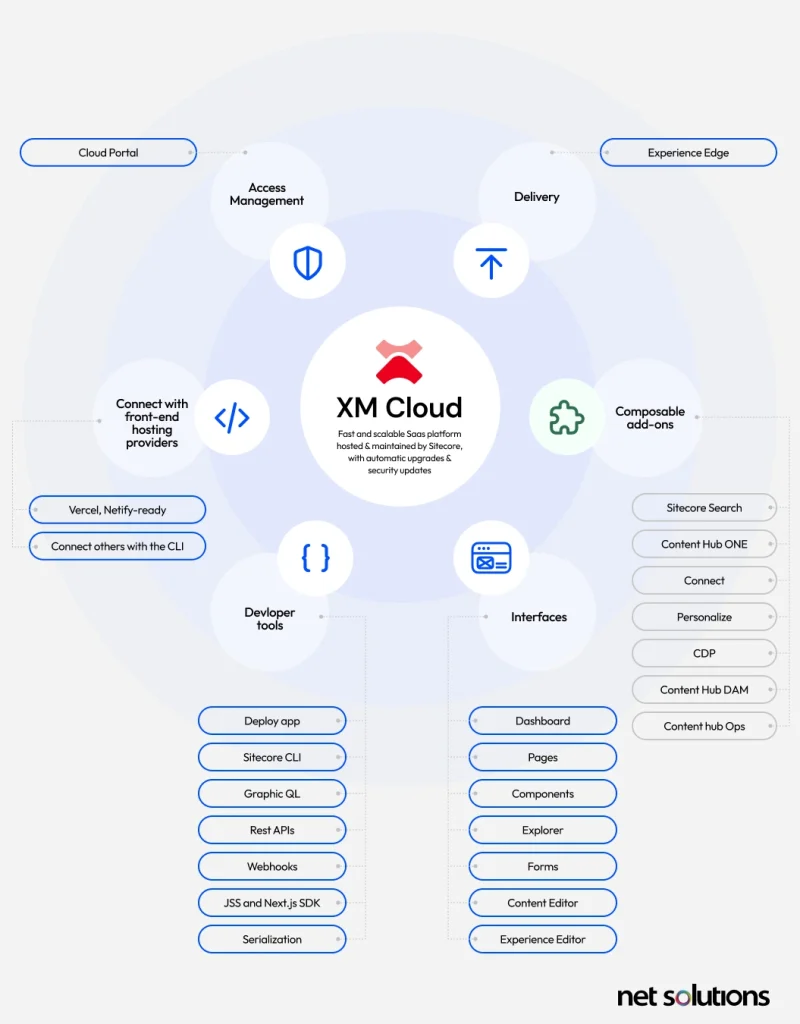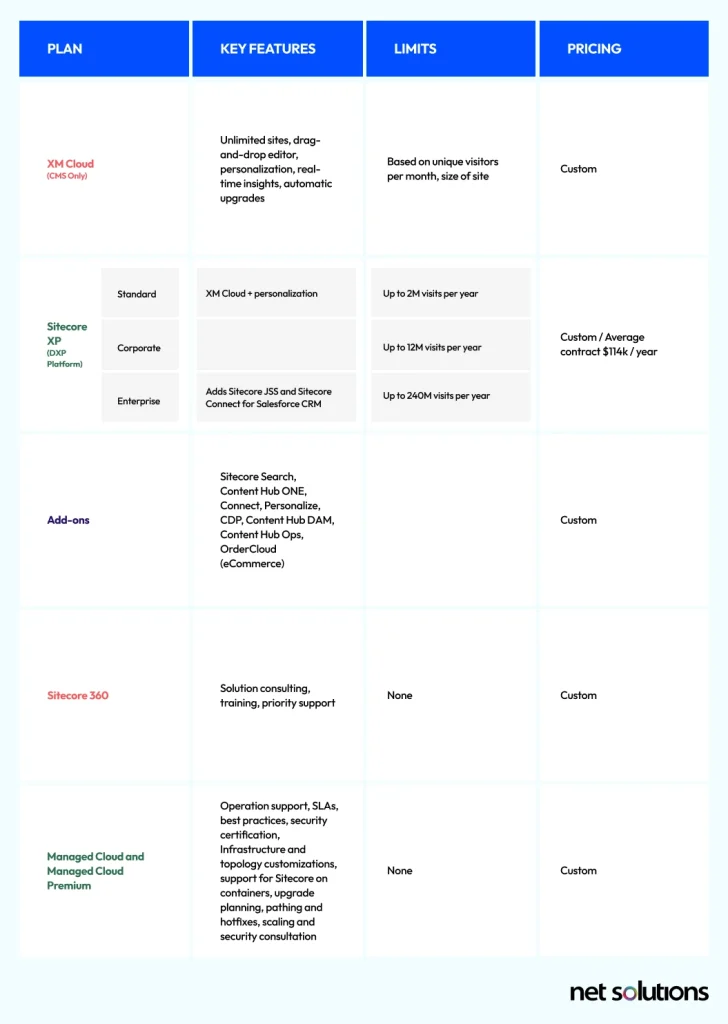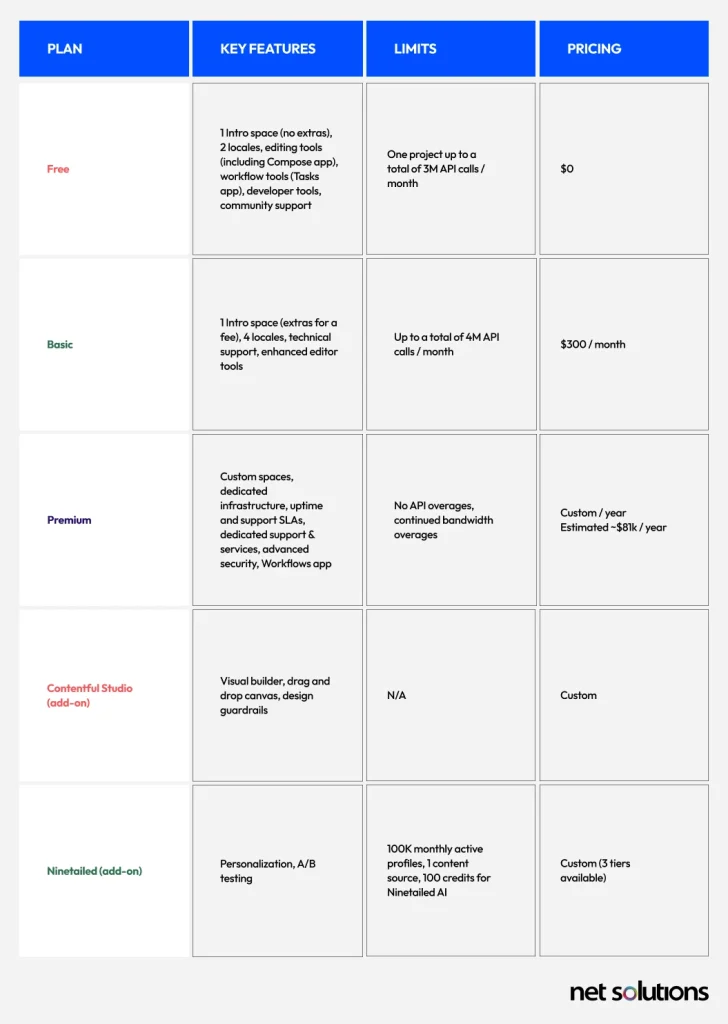The main difference between Sitecore and Contentful is that Contentful is an easier-to-use platform, for both technical and non-technical users. Sitecore and Contentful each offer composable flexibility to create digital experiences, but user experience is one area where the two platforms have the greatest divergence (though we’ll examine many other areas).
In this guide, you will find a full comparison between these two composable headless content management systems (CMS) to help you determine which is right for you. The comparison will look at:
- Key features of Sitecore and Contentful
- Key benefits and potential drawbacks of each platform
- A side-by-side analysis of capabilities
- A helpful guide to choose which platform is right for you
Disclaimer: The information below is accurate as of Novemeber 8, 2024.
Sitecore Overview
Sitecore is an enterprise digital experience platform (DXP), a platform that includes a CMS plus added capabilities to manage experiences at scale. Customers have the choice of purchasing the Sitecore DXP platform, or the SaaS CMS only as “Sitecore XM Cloud,” which is developed as a headless CMS that gives marketers and developers the freedom to choose and develop custom front-ends (as long as supported by JSS). Sitecore is leveraged by global brands including L’Oreal Group, British Red Cross, Kimberly-Clark and Fujitsu.

Key features of Sitecore
Here are some of the key features of XM Cloud and the DXP platform developed by Sitecore.
- Real-time insights: Access to real-time customer and content analytics
- Pages content editor: XM Cloud and DXP each come with Pages, a drag-and-drop tool to create pages, layouts and content.
- Personalization: XM Cloud comes with built-in personalization, optimization and A/B testing for pages, campaigns and experiences. With the purchase of the Personalization add-on, you also gain access to real-time personalization capabilities.
Benefits of using Sitecore
Here are some of the reasons you may choose Sitecore:
1. Available as a full Digital Experience Platform (DXP)
Sitecore provides an end-to-end DXP, giving the option for brands to leverage its CMS as well as composable solutions to create digital experiences and only choose the composable solutions you want.
Author note: While Contentful does not call itself a DXP, it does enable DXP in the same way.
2. Unlimited sites
Sitecore supports an unlimited number of sites and apps, making it easy to manage across brands, regions, and languages.
3. Headless Services
Sitecore supports headless development with composable services, APIs and SDKs to support developers making custom front-ends.
4. Edge caching
Sitecore XM Cloud and the DXP platform each use Experience Edge technology to leverage servers around the world to optimize content delivery.
Drawbacks of Sitecore
Here are some of the challenges you may encounter if you choose to use Sitecore.
1. Confusing and escalating price structure
The non-transparent pricing of Sitecore can make it difficult to estimate if the platform is competitive, with costs potentially escalating based on the number of add-ons, many of which are necessary to compete today.
2. Steep learning curve
Some say that Sitecore has the “steepest learning curve” of any CMS, so this might be a red flag for some developers or end-users.
3. Complex and slow set up
Given the above steep learning curve, headless technology, many composable services and only limited SDKs, Sitecore can be very developer heavy to set up, leading to a slower time to market.
4. Vendor lock-in
Migration away from Sitecore is very manual, so lock-in is a consideration.
Sitecore Pricing
Sitecore was previously available as a perpetual license, but now available with subscription licensing and managed hosting as a SaaS product (software as a service). Sitecore licenses are based upon site visits per year and number of concurrent users, with additional costs related to non-production installations.
Sitecore can be deployed as the full DXP or as the CMS only as XM Cloud. Additional capabilities are available as composable add-ons. Sitecore also offers service plans. The following are a best guess estimate as to pricing, based on insights from users, site documentation, and analysis.

Next, we’ll have a look at Contentful.
Contentful Overview
When we examine a list of the best headless CMS, Contentful is among the top options, recognized for its flexibility, scalability, and ease-of-use. Contentful brings structure to content, with powerful tools and AI capabilities to create and personalized experiences at scale. Contentful customers span the globe and include KraftHeinz, Audible, Vodafone and KFC.
Learn more in our complete guide: What is Contentful? If you are still evaluating CMS options, we’ve stacked up the competition as well:
RECOMMENDED READING
Key features of Contentful
Contentful helps accelerate the creation of captivating personalized experiences for clients, with KraftHeinz boasting a 78% increase in conversion after leveraging Contentful’s composability.
Here are some key features:
- Content Hub: The Content Hub consolidates content from all the silos of your organization, allowing you to create a structured data model that can make it easier to create experiences and push them out to any channel.
- Content Studio (add-on): Content Studio supports a drag-and-drop editor, patterns and design tokens to help speed up content development. This is boasted even further by AI.
- Built-in AI: The Contentful AI helps automate routine tasks around building content models, content generation, translation, image generation, and more (though some are Premium only)
- Ninetailed Personalization (*new*, add-on): New capabilities to create personalized experiences across channels.
Benefits of using Contentful
Contentful an easy-to-use platform that is built to scale, with benefits as follows:
1. Easy editing and collaboration
Contentful makes it easy for editors to create experiences, whether that’s through the Studio, through the standard interface, assisted by AI or leveraging the Compose app (simplified editing app) or Tasks app (collaboration).
2. API-First Architecture
Contentful is API-first, narrowing the focus to content, where it should go (channels), and the kinds of functionality (composable services) that can be added to deliver the experiences you’re trying to create.
3. Multi-site support
Contentful help orchestrate multi-site experiences, across brands, regions and languages. AI can assist in language translation.
4. Headless Omnichannel
Contentful a headless CMS, streamlining the publishing of content to any channel or device and allowing developers to build and customize front-ends with the aid of APIs and integrations.
5. App framework
Contentful offers an App Framework to help accelerate the development of custom apps.
Drawbacks of Contentful
Some of the challenges that you may associate with Contentful are:
1. Not a DXP by default
Contentful is not a DXP, but it does enable the creation of a DXP in almost the exact fashion as Sitecore, by enabling composability with solutions such as Ninetailed to build out additional capabilities.
2. Some developer knowledge required
Contentful can be easy to use, but it does require developers to have pre-existing knowledge about content models, APIs, and front-end development.
3. Costs can escalate
While Contentful’s plans are relatively easy to understand, most brands will want to reach the Premium level to access specialized features or can expect added costs related to add-ons such as the Studio and Ninetailed.
Contentful Pricing
The pricing tiers for the core Contentful CMS platform are based upon the volume of API calls per month, with additional costs related to the number of Contentful spaces (tiered pricing) required. Contentful pricing is as follows:

Sitecore and Contentful: Quick Comparison
To help you better dig down into how these two composable CMS platforms are different, we’ve created a side-by-side chart.
What are the main differences between Sitecore and Contentful?

Next, let’s have a look at what true users of these platforms have to say.
Sitecore vs Contentful: What Users Have to Say
While we’ve strived to provide you with unbiased information about Sitecore and Contentful, we’d also like to give you an insight into what real users have to say about each platform, thanks to reviews on G2.
What do users have to say about Sitecore?
Here are some recent and relevant reviews about Sitecore:
Pros
- Varalakshmi M: “Sitecore’s powerful personalization engine tailors content to individual users based on their behavior, preferences, and interactions, boosting engagement and conversions.”
- Kautilya P. “The Digital Marketing team does not need developers to configure campaigns, personalization rules, and presentation changes.“
- Legal Services user: “The amount of available tools to plug in abound as well, though caution is needed in making sure these tools actually meet expectations.“
Cons
- Raman G: “ There are many features, and to use them fully, you need technical skills, which can be hard for some people. Setting up and customizing advanced features needs a lot of development work and can take time and money.“
- Surendra S.: “It runs on the .NET 4.8 platform, and since Microsoft is prioritizing .NET Core with no plans to release new versions of the .NET framework, So Sitecore need to change the base technology.”
- Sakshi K: “The licensing cost is higher compared to other DXP products in market”
What do users have to say about Contentful?
Here are some of the most recent comments from real users of Contentful, representing some of the most recent features and capabilities:
Pros
- Doug C: “As a truly composable technology, it gives teams the flexibility to build exactly what they need, whether it’s for a simple site or a more complex, content-driven application.”
- Alzbeta: “As a Localization Manager, I appreciate how easily different language versions can be added to each Contentful entry.”
- Museum user: “You will quickly understand how to work with this headless CMS and what options it offers for building web pages. You can choose from different content types to work with, resulting in varied-looking pages. The ability to call a content type of your choice from anywhere on a page is useful and saves a lot of time.”
Cons
- Ximena: “In my personal experience, one of the things that I dislike is that if you don’t have the newest version, there are many things that you can’t do.”
- Program developer user: “Contentful’s data modeling approach and the use of the GraphQL API can be challenging for teams without prior experience in these areas. This can lead to a slower adoption rate and potentially longer project timelines.”
- Thomas: “It’s a pity we can’t benefit from all the new features because the NPO pricing model has been adjusted. We’d be very happy to pay part of the cost, but we can’t keep up with the “large space” model.”
The Bottom Line
So, how do you choose between two CMS, each of which is headless and composable?
What is Sitecore best for?
Sitecore is designed to help larger organizations build and scale experiences across channels, particularly designed for multi-site, multi-brand and global organizations who don’t want a limit on the number of sites they manage. It can be used for:
- Unlimited websites
- Multilingual websites
- Mobile apps
- eCommerce sites (limited)
What is Contentful best for?
Contentful is best for businesses of any size who are looking to future-proof their CMS investment with a headless architecture, but also want to enable their marketing teams with super easy-to-use tools. Contentful is ideal for small to large teams to help build:
- Multi-site, multi-brand, multilingual websites
- Mobile apps
- Knowledge bases or portals
- Interactive guides
- eCommerce sites
Ready to get started?
If you’re looking to dig further into why Contentful is a powerful CMS, helping organizations scale and evolve with changing consumer expectations, we’d be happy to schedule an exploration call. Net Solutions is a proud Contentful partner, offering a wealth of experience in setting up and optimizing Contentful sites, as we recently demonstrated for a global cryptocurrency leader.



